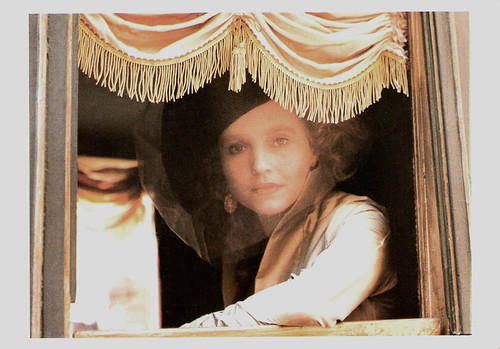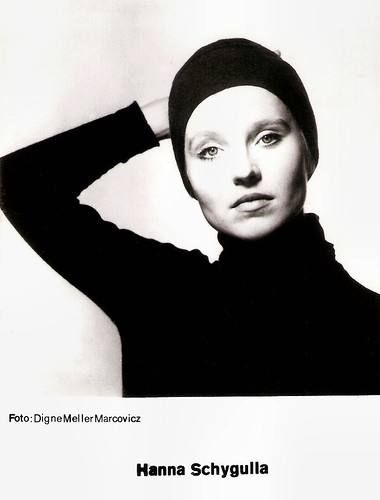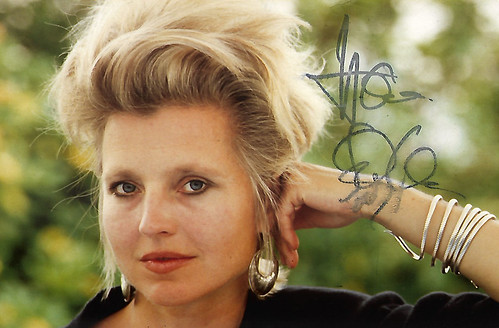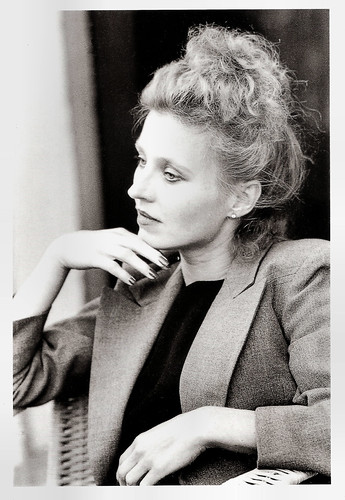
Dutch freecard by Free Card, Haarlem for the R.W. Fassbinder retrospective at Rialto and De Meervaart, Amsterdam 1993 Hanna Schygulla in Lili Marleen (Rainer Werner Fassbinder, 1980).

American postcard by Abbeville Publishing Group, New York. Photo: Cinetext, Frankfurt. Hanna Schygulla in Lili Marleen (Rainer Werner Fassbinder, 1980).

French postcard by Editions La Malibran, Paris, no. MC 21. Photo: publicity still for La Nuit de Varennes (Ettore Scola, 1982).
Love is Colder Than Death
Hanna Schygulla was born in Königshütte Upper Silesia, a section of Poland annexed by the Third Reich (now Chorzów in Poland), on Christmas Day 1943. Her parents were Antonie (née Mzyk) and Joseph Schygulla, a timber merchant by profession. Her father was drafted as an infantryman in the German Army and was captured by American forces in Italy, subsequently being held as a prisoner of war until 1948, when Hanna was 5. In 1945, Schygulla, and her mother, arrived as refugees in Munich following the expulsion of the majority German population of Königshütte by Communist Poland.
In the 1960s, Schygulla studied Roman languages and German studies, while taking acting lessons in Munich during her spare time. She met Rainer Werner Fassbinder in 1965 and became a member of his collective theatre troupe, Munich Action Theatre. This group eventually evolved into Fassbinder’s film group, and Schygulla played the female lead in his first feature film Liebe ist kälter als der Tod/Love is Colder Than Death (Rainer Werner Fassbinder, 1969). The reception was generally negative, and the film was even booed at the 19th Berlin International Film Festival in 1969. Today, it is seen as a fine example of Fassbinder's early style, with a heavy 'Nouvelle Vague' influence. The cast as an ensemble won an award at the German Film Awards in 1970.
She was again the lead actress in Katzelmacher (Rainer Werner Fassbinder, 1969). The film centers on an aimless group of friends whose lives are shaken up by the arrival of an immigrant Greek worker, Jorgos (played by Fassbinder himself, in an uncredited role). Other early Fassbinder films in which she starred were Götter der Pest/Gods of the Plague (Rainer Werner Fassbinder, 1970) with Margaretha von Trotta and Harry Baer, Rio das Mortes (Rainer Werner Fassbinder, 1971), and the Western Whity (Rainer Werner Fassbinder, 1971) with Günther Kaufmann.
The filming of Whity in Spain inspired the Semi-autobiographical drama Warnung vor einer heiligen Nutte/Beware of a Holy Whore (Rainer Werner Fassbinder, 1971) featuring Lou Castel, Eddie Constantine, Schygulla and Fassbinder himself. Holed up in a hotel with too much drink, drugs and time, the cast and crew of a film are gradually disintegrating as they await the arrival of their director. Very interesting was also Händler der vier Jahreszeiten/The Merchant of Four Seasons (Rainer Werner Fassbinder, 1971) featuring Hans Hirschmueller as a fruit-peddler in 1950s West Germany, who is driven over the edge by an uncaring society.
The following year Schygulla played the object of obsession for fashion designer Petra von Kant (Margit Carstensen) in Die bitteren Tränen der Petra von Kant/The Bitter Tears of Petra von Kant (Rainer Werner Fassbinder, 1972). During the making of Effi Briest (1974), an adaptation of a German novel by Theodor Fontane, Fassbinder and Schygulla fell out over divergent interpretations of the character. Another problem for Schygulla was the low pay, and she led a revolt against Fassbinder on this issue during production in 1972. Fassbinder's response was typically blunt: "I can't stand the sight of your face any more. You bust my balls". After the clash, she did not work with him again for five years.

German autograph card.

German card. Photo: Digne Meller Marcovicz.

German card. Photo: Digne Meller Marcovicz.
The marriage of Maria Braun
Hanna Schygulla started to work with other film makers. She played the female lead in Falsche Bewegung/The Wrong Move (1975), a road movie directed by one of the other major directors of the New German Cinema, Wim Wenders.
In 1978, she reunited with Fassbinder for one of their greatest successes Die Ehe der Maria Braun/The Marriage of Maria Braun (Rainer Werner Fassbinder, 1979). Schygulla starred as Maria, whose marriage to the soldier Hermann remained unfulfilled due to World War II and his post-war imprisonment. Maria adapts to the realities of post-war Germany and becomes the wealthy mistress of an industrialist, all the while staying true to her love for Hermann. Critic Derek Malcolm called it in The Guardian ‘a landmark in German cinema’: “Schygulla gives a magnificent performance as a vulnerable young woman who becomes a self-confident, independent and competent survivor yet still comes to a bad end, largely because of the basic corruption of her world”. The film was entered into the 29th Berlin International Film Festival, where Schygulla won the Silver Bear for Best Actress for her performance.
She also appeared opposite Günter Lamprecht in the 14-part television miniseries Berlin Alexanderplatz (1980), adapted and directed by Rainer Werner Fassbinder from the Alfred Döblin novel of the same name. Another success was Lili Marleen (Rainer Werner Fassbinder, 1981), based on the autobiographical novel Der Himmel hat viele Farben (Heaven Has Many Colors) by singer Lale Andersen. The film tells about the forbidden love between the German singer Willie (Schygulla) and the Swiss Jewish composer Robert Mendelssohn (a character based on Rolf Liebermann and played by Giancarlo Giannini), who actively seeks to help an underground group of German Jews during the Third Reich. It was to be her last film with Fassbinder, who died in 1982 at the age of 37.
In the following decade, Schygulla acted in French, Italian and American productions. Among her best known films are La Nuit de Varennes/That Night in Varennes (Ettore Scola, 1982), Passion (Jean-Luc Godard, 1982) with Isabelle Huppert, Storia di Piera/The Story of Piera (Marco Ferreri, 1983) with Huppert and Marcello Mastroianni, Eine Liebe in Deutschland/A Love in Germany (Andrzej Wajda, 1983), and the psychological thriller Dead Again (Kenneth Branagh, 1990) starring Branagh and Emma Thompson. In the 1990s Schygulla also became known and well regarded as a chanson singer. In Juliane Lorenz's documentary film Life, Love and Celluloid (1998), on Fassbinder and related topics, Schygulla performs several songs.
Hanna Schugulla continued to make interesting films, like Werckmeister Harmóniák/Werckmeister Harmonies (Bela Tarr, 2000) and Auf der anderen Seite/The Edge of Heaven (Fatih Akın, 2007). In 2010, she received the Honorary Golden Bear from the Berlin Film Festival. A year later she played in the Russian film Faust (Alexander Sokurov, 2011), a free interpretation of the Faust legend and its literary adaptations by Johann Wolfgang von Goethe and Thomas Mann. The film won the Golden Lion at the 68th Venice International Film Festival. At the end of 2013, she published her autobiography, 'Wach auf und träume', to mark her 70th birthday. Hanna Schygulla who lived in Paris since 1981, returned to Berlin in 2014. Among her recent films are the French dramas La prière/The Prayer (Cédric Kahn, 2018) and Peter von Kant (François Ozon, 2022), an adaptation of Die bitteren Tränen der Petra von Kant/The Bitter Tears of Petra von Kant in which she played Peter's mother.

German autograph card.

French postcard by Editions Gendre, no. XL 3. Photo: Xavier Lambours. Caption: Hanna Schugulla, Cannes, May 1983.

French postcard in the Collection Magie Noire by Editions Hazan, Paris, 1992, no. 6330. Photo: Catherine Faux.

German autograph card. Photo: Lillian Birnbaum, Paris, 1992 (detail). Cover of Hanna Schygulla's autobiography 'Wach auf und träume' (Wake Up and Dream) by SchirmerMosel.

German autograph card.
Scenes from Lili Marleen (Rainer Werner Fassbinder, 1981). Source: Meloclips (YouTube).
Sources: Derek Malcolm (The Guardian), David Stevens (IMDb), AllMovie, Deutschland.de, Wikipedia, and IMDb.
No comments:
Post a Comment